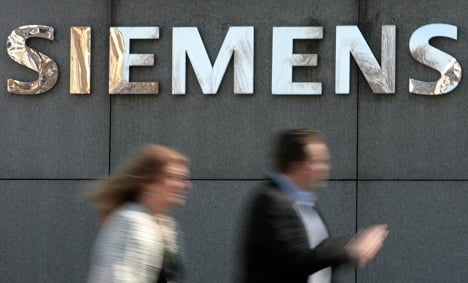Shares in the company rapidly posted a steep drop in early trading on the Frankfurt stock exchange.
Siemens booked several heavy charges that resulted in the sharp decline in net profit to €501 million ($719 million).
The drop was due in large part to the “re-evaluation of the commercial feasibility of particle therapy,” a subject of research by the group’s medical equipment unit, and the result of an arbitration decision on a joint venture with the French group Areva, a Siemens statement said.
Analysts polled by Dow Jones Newswires had expected a much smaller decline in net profit to €949 million.
Siemens shares showed a loss of 1.91 percent to €89.41 euros in early Frankfurt trading, while the DAX index on which they are listed was down by 0.97 percent overall.
An arbitration panel has ordered Siemens to pay Areva €648 million plus interest following Siemens’ withdrawal from a joint venture with the French company, and analysts had included that charge in their calculations.
What they did not expect was another charge of €381 million owing to Siemens’ re-evaluation of the feasibility of particle therapy, a new treatment for cancer.
The German group also booked a loss of €305 million in its information technology division which is being sold to the French firm Atos.
Siemens chief executive Peter Löscher gave a cautious outlook for the group’s full fiscal year, which runs from October 1 to September 30, saying: “Our markets are still robust, although the risks are increasing somewhat in the global economic environment.”
Those risks included the possible overheating of some emerging economies and fluctuating raw material prices, he added.
Löscher’s contract has been renewed for five years until 2017.
The company also reaffirmed its forecast for continuing operations to make a profit of at least €7.5 billion, excluding payment to Areva.
They had generated a profit of €4.3 billion in the previous exercise.
Siemens also expects new orders to rise significantly, and sales growth of around five percent.
Sales at its core industry, energy and medical technology divisions edged up by 2.0 percent from the third quarter of its previous fiscal year meanwhile, to €17.84 billion.
New orders surged by 20 percent to almost €23 billion, thanks to a huge new German railway order.
Siemens makes a broad range of products, from hearing aids to wind turbines and high-speed trains.
AFP/mdm



 Please whitelist us to continue reading.
Please whitelist us to continue reading.
Member comments